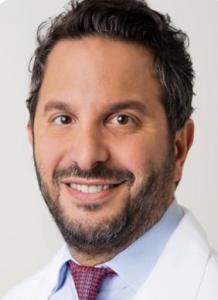Cardiologist Dr. Robert Segal with Manhattan Cardiology explains hypertension contributors and treatments
Who is At Risk for Hypertension, the Medical Term for High Blood Pressure?
But these numbers are simply unacceptable, since high blood pressure—when blood pushes against artery walls more forcefully than normal—caused or contributed to more than 670,000 deaths in the United States in 2020, according to the U.S. Centers for Disease Control and Prevention (CDC). The condition is defined as blood pressure that’s at or above 130 mmHg (systolic pressure) over 80 mmHg (diastolic pressure). bit.ly/415g5I1
Since the condition, known medically as hypertension, places people at risk for heart disease, stroke, and kidney disease—leading causes of death in the United States—high blood pressure just can’t be ignored, Dr. Segal says.
“What makes it even more dangerous is that it often produces no symptoms,” says Dr. Segal, a fellow of the American College of Cardiology whose research has been published in many respected medical journals. “Some people with high blood pressure may experience headaches, shortness of breath, or nosebleeds, but these signs aren’t exclusive to it and often don’t occur until high blood pressure has become severe or life-threatening.”
What leads to high blood pressure?
Anyone can develop high blood pressure, but certain risk factors make it more likely, Dr. Segal says. These include:
• Family history: Family members have high blood pressure, heart disease, or diabetes.
• Race: Black people are more predisposed than those from other groups.
• Age: It’s more common in people over 55.
• Weight: Those overweight or obese are more apt to develop high blood pressure.
• Sedentary: Exercise can help stave off the condition.
• High-salt diet
• Tobacco use
• Alcohol use: More than one drink per day for women, or two for men, can raise the odds.
“It’s clear that lifestyle choices play a large role in who develops high blood pressure, though that’s not always the case,” Dr. Segal explains. “There’s no single cause for the condition, but there are certainly plenty of contributing factors.”
How high blood pressure is diagnosed and treated
High blood pressure is fairly straightforward to diagnose, Dr. Segal says. Doing so involves checking blood pressure with a special cuff or device. This is usually done at an annual check-up or doctor’s appointment. “If the reading is high at two or more visits, your doctor may tell you that you have high blood pressure,” he explains.
Treating the condition, however, is quite individualized, depending on a person’s other health conditions, lifestyle, age and other contributing factors. Medical guidelines help doctors match the best blood pressure drugs to each person, with several main classes of medications available—each working a little differently to reduce blood pressure. According to Dr. Segal, these include:
• Beta blockers, reducing heart rate and cutting the heart’s workload
• Diuretics, which help the kidneys remove extra salt and water from the body
• ACE inhibitors, which help blood vessels stay relaxed by blocking an enzyme that causes them to tighten
• ARBs, which block a receptor that constricts blood vessels
• Calcium channel blockers, which relax blood vessels
Often, people with high blood pressure need more than one medication to successfully treat it, Dr. Segal notes. But they should also blend a healthy lifestyle with prescription medications for a one-two punch to keep the condition at bay.
“Eat foods lower in fat, salt and calories, and make physical activity a bigger part of your day,” he advises. “Simple, commonsense measures can both prevent high blood pressure and help keep it under control.”
Manhattan Cardiology is the premier facility for preventive cardiology treatment in New York. Our cardiologists practice under the guiding principle that early detection is the best form of prevention. www.manhattancardiology.com
Dr. Robert Segal is a board-certified cardiologist and the founder of Manhattan Cardiology, Medical Offices of Manhattan and co-founder of LabFinder. www.manhattancardiology.com www.medicalofficesofmanhattan.com www.LabFinder.com
Contact:
www.mcprpublicrelations.com
Melissa Chefec
MCPR, LLC
+1 203-968-6625
melissa@mcprpublicrelations.com
Legal Disclaimer:
EIN Presswire provides this news content "as is" without warranty of any kind. We do not accept any responsibility or liability for the accuracy, content, images, videos, licenses, completeness, legality, or reliability of the information contained in this article. If you have any complaints or copyright issues related to this article, kindly contact the author above.

